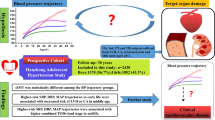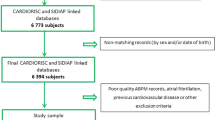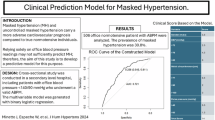Abstract
Limited evidence is available about the relationship between ambulatory heart rate (HR) and target organ damage (TOD) in uncomplicated hypertension. We sought to investigate the association between ambulatory HR and subclinical cardiac, vascular and renal markers of TOD in never-treated essential hypertensives. A total of 580 subjects with recently diagnosed (⩽1 year) grade 1 and 2 hypertension, categorized by tertiles of HR levels, assessed by two 24-h ambulatory blood pressure monitoring at 1- to 4-week interval, sex and the presence or absence of TOD were considered for this analysis. All subjects also underwent laboratory and ultrasonographic investigations searching for microalbuminuria (MA), left ventricular hypertrophy (LVH) and carotid atherosclerosis (carotid thickening/plaque). In the whole population, as well as in both genders, LVH, carotid atherosclerosis and MA prevalence rates did not significantly increase with 48-h HR tertiles. When patients were categorized according to the presence or absence of TOD (that is, LVH, carotid atherosclerosis or MA) no significant intergroup differences in 48-h HR were found. Furthermore, average 48-h HR was similar in patients without organ involvement as in those with one, two or three TOD signs. Finally, in a multivariate analysis age, 48-h systolic blood pressure and metabolic syndrome assessed by ATP III criteria, but not HR were independently associated with TOD. Our findings showing that 48-h ambulatory HR is not associated with markers of TOD do not support the view that a faster HR may have an additive value in predicting organ damage in the early phases of essential hypertension.
This is a preview of subscription content, access via your institution
Access options
Subscribe to this journal
Receive 12 digital issues and online access to articles
118,99 € per year
only 9,92 € per issue
Buy this article
- Purchase on SpringerLink
- Instant access to full article PDF
Prices may be subject to local taxes which are calculated during checkout

Similar content being viewed by others
References
Levy RL, White PD, Stroud WD, Hillman CC . Transient tachycardia: prognostic significance alone and in association with transient hypertension. JAMA 1945; 129: 585–588.
Palatini P, Julius S . Heart rate and the cardiovascular risk. J Hypertens 1997; 15: 3–17.
Palatini P, Benetos A, Grassi G, Julius S, Kjeldsen SE, Mancia G et al. Identification and management of the hypertensive patient with elevated heart rate: statement of a European Society Hypertension Consensus Meeting. J Hypertens 2006; 24: 603–610.
Erikssen J, Rodahl K . Resting heart rate in apparently healthy middle-aged men. Eur J Appl Physiol 1979; 42: 61–69.
Nakiewicz K, Somers VK . Interactive effect of heart rate and muscle sympathetic nerve activity on blood pressure. Circulation 1999; 100: 2514–2518.
Gillmann MW, Kannel WB, Belanger A, D'Agostino RB . Influence of heart rate on mortality among persons with hypertension: the Framingham study. Am Heart J 1993; 125: 1148–1154.
Benetos A, Rudnichi A, Thomas F, Safar M, Guize L . Influence of heart rate on mortality in a French population: role of age, gender and blood pressure. Hypertension 1999; 33: 44–52.
Thomas F, Rudnichi A, Bacri AM, Bean K, Guize L, Benetos A . Cardiovascular mortality in hypertensive men according to presence of associated risk factors. Hypertension 2001; 37: 1256–1261.
Palatini PL, Thijs L, Staessen JA, Fagard RH, Bulpitt CJ, Clement D et al. Predictive value of clinic and ambulatory heart rate for mortality in elderly subjects with systolic hypertension. Arch Intern Med 2002; 162: 2313–2321.
Sa Cunha R, Pannier B, Benetos A, Sichè JP, London GM, Mallion JM et al. Association between high heart rate and high arterial rigidity in normotensive and hypertensive subjects. J Hypertens 1997; 15: 1423–1430.
Heidland UE, Strauer BE . Left ventricular muscle mass and elevated heart rate are associated with coronary plaque disruption. Circulation 2001; 104: 1477–1482.
Zakopoulos NA, Ikonomidis I, Vemmos KN, Manios E, Spiliopoulou I, Tisivgoulis G et al. Twenty-four-hour heart rate and blood pressure are additive markers of left ventricular mass in hypertensive subjects. Am J Hypertens 2006; 19: 170–177.
Williams B, Poulter NR, Brown MJ, Gordon MD, McInnes GT, Potter JF et al. British Hypertension Society guidelines for hypertension management 2004 (BHS-IV): summary. BMJ 2004; 328: 634–640.
Chobanian AV, Bakris GL, Black HR, Cushman WC, Green LA, Izzo JL et al. The seventh report of the Joint National Committee on prevention, detection, evaluation, and treatment of high blood pressure. The JNC 7 Report. JAMA 2003; 289: 2560–2572.
Guidelines Committee. 2003 European Society of Hypertension—European Society of Cardiology guidelines for the Management of Arterial Hypertension. J Hypertens 2003; 21: 1011–1053.
World Health Organization, International Society of Hypertension Writing Group. 2003 World Health Organization (WHO)/International Society of Hypertension (ISH) Statement on Management of Hypertension. J Hypertens 2003; 21: 1983–1992.
Cuspidi C, Meani S, Fusi V, Valerio C, Catini E, Sala C et al. Prevalence and correlates of left atrial enlargement in essential hypertension: role of ventricular geometry and the metabolic syndrome. The Evaluation of target Organ Damage in Hypertension study. J Hypertens 2005; 23: 875–882.
Devereux RB, Reickek N . Echocardiographic determination of left ventricular mass in man. Anatomic validation of the method. Circulation 1977; 55: 613–618.
Ganau A, Devereux RB, Roman MJ, de Simone G, Pickering TG, Saba TG et al. Patterns of left ventricular geometry and geometric remodelling in essential hypertension. J Am Coll Cardiol 1992; 19: 1550–1558.
Pignoli P, Tremoli E, Poli A, Paoletti R . Intimal plus media thickness of the arterial wall: a direct measurement with ultrasound imaging. Circulation 1986; 74: 1399–1408.
de Simone G, Devereux RB, Daniels SR, Koren MJ, Meyer RA, Laragh JH . Effect of growth on variability of left ventricular mass; assessment of allometric signals in adults and children and their capacity to predict cardiovascular risk. J Am Coll Cardiol 1995; 25: 1056–1062.
Cuspidi C, Lonati L, Macca G, Sampieri L, Fusi V, Michev I et al. Prevalence of left ventricular hypertrophy and carotid thickening in a large selected population: impact of different echocardiographic and ultrasonographic diagnostic criteria. Blood Press 2001; 10: 142–149.
Armario P, del Rey RH, Sanchez P, Martin-Baranera M, Torres G, Julia J et al. Determinants of left ventricular mass in untreated mildly hypertensive subjects: hospitalet study in mild hypertension. Am J Hypertens 1999; 12: 1084–1090.
Berenson GS, Vooks AW, Webber LS, Dalferes Jr ER, Harsha DW . Racial differences of parameters associated with blood pressure levels in children. The Bogalusa Heart Study. Metabolism 1979; 28: 2218–2228.
Palatini P, Winnicki M, Santonastaso M, De Venuto G, Zanata G, Bertolo O et al. Reproducibility of heart rate measured in the clinic and with 24-h intermittent recorders. Am J Hypertens 2000; 13: 92–98.
Author information
Authors and Affiliations
Corresponding author
Additional information
Conflict of interest
None.
Rights and permissions
About this article
Cite this article
Cuspidi, C., Valerio, C., Meani, S. et al. Ambulatory heart rate and target organ damage in never-treated essential hypertensives. J Hum Hypertens 22, 89–95 (2008). https://doi.org/10.1038/sj.jhh.1002281
Received:
Revised:
Accepted:
Published:
Issue Date:
DOI: https://doi.org/10.1038/sj.jhh.1002281
Keywords
This article is cited by
-
Office and 24-hour heart rate and target organ damage in hypertensive patients
BMC Cardiovascular Disorders (2012)



